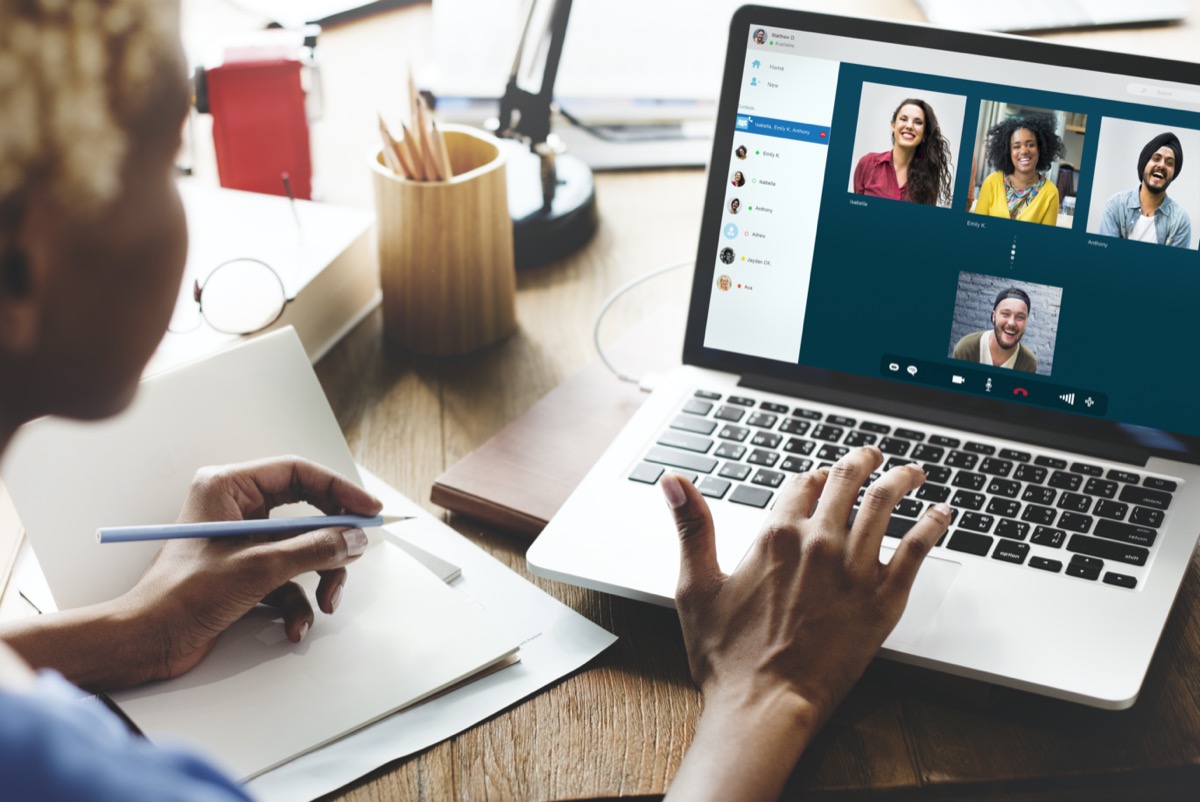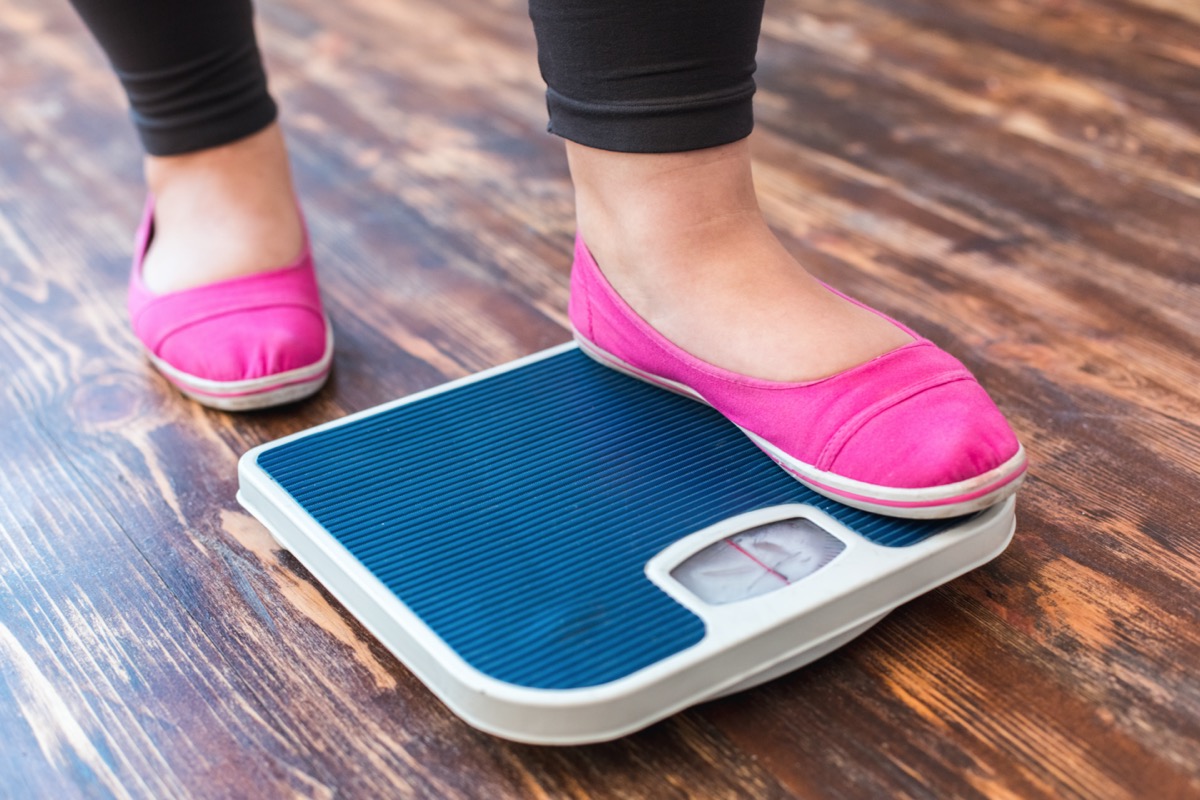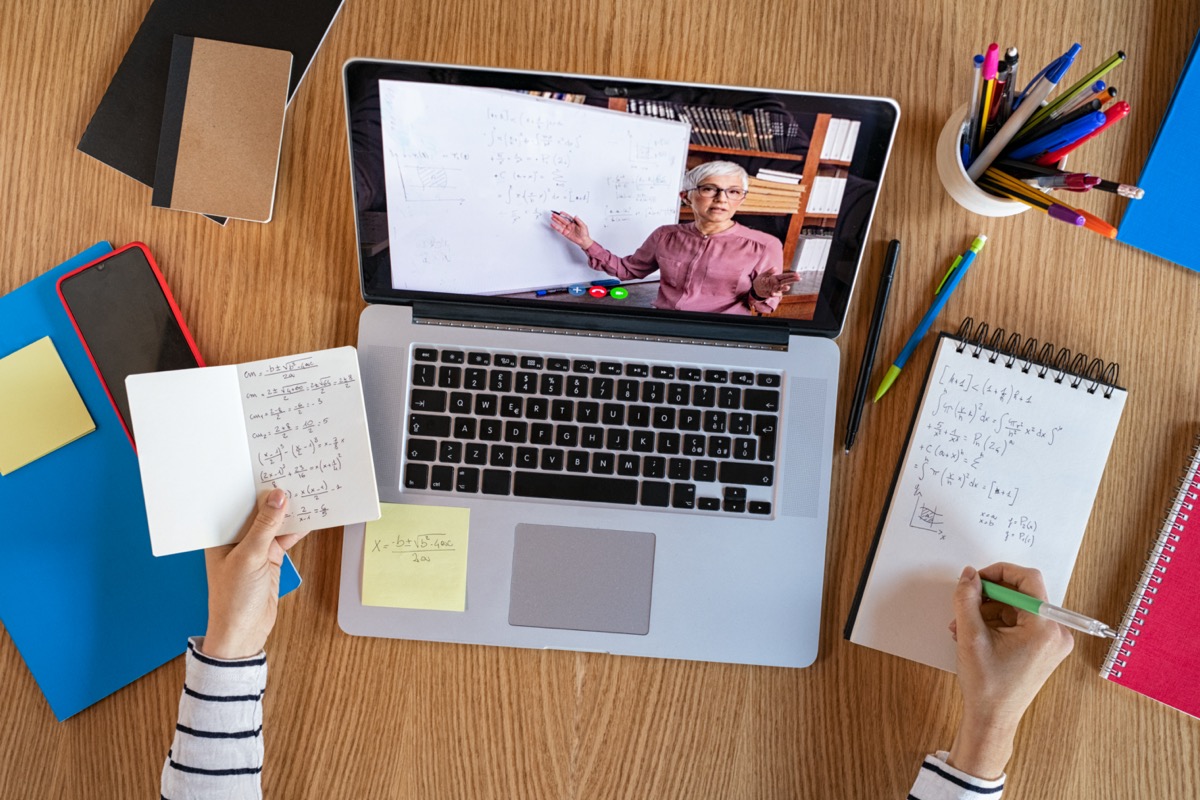How Not To Forget What You Learn Long Term
Ever walk into a room and forget why you went in there? Or stare at a colleague's face up for twenty seconds before you remember his proper name? Or attempt to remember the name of that movie, the one you loved, starring that guy—it's on the tip of your natural language! (It's Jeff Goldblum. The Thou Budapest Hotel.)
Forgetfulness is normal and if you lot feel like yous've noticed it more recently, you're non losing your marbles. You're just getting older. Co-ordinate to Harvard Health, in that location are 7 types of normal forgetfulness. These include:
- Transience. Forgetting facts over fourth dimension.
- Absentmindedness. Forgetting because y'all're non paying attention.
- Blocking. The inability to retrieve a memory.
- Misattribution. But remembering part of something.
- Suggestibility. Misconstruing facts about an incident.
- Bias. Adding your personal bias to facts about a retentiveness.
- Persistence. Memories that won't go away.
Unless your retentivity loss is extreme or persistent, there's no need to worry near Alzheimer's or other serious memory diseases. (Dr. Gary Small-scale, MD, a professor on aging at the David Geffen School of Medicine at UCLA, says "Nigh 40% of people aged 65 or older have age associated memory damage—in the Us, about 16 million people.") But if your forgetfulness is simply driving you lot crazy, check out these unproblematic strategies, techniques, and lifestyle changes you can make to improve your retentivity. Read on—Read on to discover out more—and to ensure your health and the health of others, don't miss these Sure Signs Yous've Already Had COVID.

Repetition is one of the easiest and most effective methods for remembering things. According to the Academy of Illinois, the Spaced Interval Repetition (SIR) technique was adult in the 1960's by famous psychologist, Hermann Ebbinghaus. It uses repetition at specific intervals to ensure you lot remember a fact or proper noun. After y'all learn something and you lot desire to keep remembering information technology in the brusque-term, echo the fact to yourself:
- Correct after y'all learn it.
- 15 to xx minutes after you initially learned it.
- After half-dozen to eight hours.
- 24 hours later.
If you want to memorize something in the long-term, you'll demand to repeat it to yourself after one mean solar day, afterwards two to three weeks, and then once more after two to three months.

Even if you think you part better in the morning time or late at night, studies show that it's easier to retain information if y'all larn it and review it in the afternoon. A report published in the Brazilian Journal of Medical and Biological Research proved this theory. 68 undergraduate participants were provided with words to recall. 1 grouping was asked to only study in the morning while the other group but studied in the afternoon. The results concluded that, "The subjects who caused information in the afternoon had amend performance than those who acquired information technology in the morning."

We don't mean a note in your smartphone or a md on your figurer. Put an actual pen or pencil to paper. Researchers at the University of Oregon conducted a study to come across if physical newspaper readers comprehend better than those who read their daily news stories online. The report concluded that "Print news readers retrieve significantly more news stories than online readers."
Reading online and from a computer screen is harder to think than when it's written on physical newspaper. If you truly want to remember a fact or name, write information technology down on a piece of paper and review information technology by physically picking it up and reading it.

The "chunking" method of retentiveness is just as it sounds. Yous tin chunk together tidbits of information to arrive easier to remember, relating the info on some mutual ground. For example, if yous're trying to memorize the items you need on a trip to the grocery shop, you could chunk together items by where y'all'll find them in the store. So, apples, potatoes, and lettuce would all be chunked together every bit "produce" while soups and tomato sauce would exist chunked together as "canned goods." Categorizing these items together makes them easier to retrieve than looking at a long listing of unrelated items.
"The do good of a chunking machinery is that it mediates the amount of cognition that ane can process at any 1 time," claims an article published in Frontiers in Psychology. By using the chunking method on a big amount of data or a long list of items, y'all may be able to more easily commit this information to your brusk-term memory.

In order to retrieve something, you have to be interested in information technology. If your brain is bored, it tin be hard to make information technology engage and truly learn new information. When you're stuck trying to learn boring material, you'll need to find a way to brand it intriguing for your brain. Sometimes making a story or creating a scene that includes this information tin can exist just what yous need to engage your encephalon.
A study published by the American Clan for the Advocacy of Science (AAAS) analyzed how people reacted to scenes that were created. The written report concluded, "The subjects were far more likely to remember high-value scenes than low-value scenes." If yous're going to apply this visual strategy to call back data, it's of import to create a scene or story in your head that's interesting to you or ridiculous enough to go along your brain involved. For instance, "One 24-hour interval, I went on vacation to Budapest and who did I see in the lobby, reading a newspaper? Jeff Goldblum! What a grand hotel!"
RELATED: The #1 Cause of Shingles, Co-ordinate to Scientific discipline

"In 1492, Columbus sailed the ocean blue." When you were a child learning the months of the yr or the states, chances are your teacher sang you a little song to help you commit the complex concept to memory. You probably still recollect these songs or rhymes and y'all might have even used them to assistance teach your kids the same concepts.
You can still use rhymes or songs to remember information every bit an adult, equally long yous're ready to tap into your creative side. Have a recognizable tune, such as "Twinkle, Twinkle, Footling Star" and set the information you need to remember to the crush. If this isn't working for you, create a rhyme that y'all can easily repeat using the information. According to The Memory Constitute, "Rhyme, rhythm, repetition and melody will help you call back by taking advantage of auditory encoding and your brain'south impressive ability to shop these audio triggers."

You lot can create your own "memory palace" when yous begin to associate memories and things you lot desire to remember with physical items in your environment. This learning method is too referred to equally the method of loci (MOL). It was developed in Ancient Greece and has been used ever since. You can tap into this learning method past associating a concrete particular in your current location with one concept you're trying to learn. When you lot attempt to recall this piece of information, you lot'll need to visualize the room you lot were in when you were learning it. By envisioning the item, your memory should retrieve the fact you want to remember.
A study published in Advances in Physiology Educational activity observed 78 2d-year medical students as they learned nearly endocrinology while using the "memory palace" method. The students found the method helpful in retaining information. The study concluded, "When asked to report whether they plant the MOL helpful, all participants agreed. Near 85.7% of the participants agreed that it helped them understand the topic ameliorate."

When your class schoolhouse teachers used to spring pop quizzes on the form sporadically, they were actually on to something. Quizzing yourself periodically can be one of the almost helpful techniques for remembering information. According to Rosalind Potts, Ph.D., from University Higher London, "People often think testing is useful because information technology tells you lot what you know and what you don't. Merely the more important power of testing is giving yous practice retrieving data you lot've learned and establishing that connexion in the brain."
Yous don't have to create a formal test just to remember your grocery list. Only take the time to periodically quiz yourself on the relevant information you want to retain.

Every bit humans, especially adult humans, our brains are going a mile a minute. In an instant, your brain may simultaneously exist thinking nearly whether you turned off the stove, what time your meeting is scheduled for tomorrow, and if in that location are any good movies out. According to Psychology Today, you have nearly seventy,000 thoughts per day. With all this happening in your head at one time, no wonder it's hard to remember things.
If you're learning something that you know yous desire to remember, you'll have to cake these thousands of thoughts out. To focus and remember, the Mayo Clinic suggests quitting the multitasking while you're trying to larn something new. Y'all should also:
- End thinking about what yous need to do after you focus.
- Take moments to practice focusing on specific subjects.
- Acquire the time of twenty-four hour period when you're the best focused and cutting yourself slack in the moments you lot know yous aren't.
- Stay away from distractions when you lot're focusing, including co-worker chit-chat, the Goggle box, radio, or your smartphone.
When you've mastered the ability to focus on one matter at a time, you may observe improvements in both your retentiveness and your productivity.

Acrostics and acronyms are mnemonic devices that you can use to remember streams of words or phrases. One of the most popular acrostics you lot may remember if you ever learned how to play a musical musical instrument is "Every Good Male child Does Fine." This acronym helps yous to remember the guild of the treble clef, which is EGBDF. If you were ever tasked with learning the names of the Great Lakes, your teacher may have used the acronym "HOMES," which stands for Huron, Ontario, Michigan, Eerie, and Superior.
Co-ordinate to the University of Denver, both acrostics and acronyms are helpful when you demand quick retentiveness aids. However, using these word associations may only be useful for memorization and usually tin can't help you to call up in-depth concepts or context and meaning behind phrases.
RELATED: Everyday Habits That Shorten Your Life, According to Science

Since we already know that re-learning is much easier than learning from scratch, it tin can besides help to relate new concepts yous want to remember to those you already know. This learning concept is formally referred to as "relational learning."
For example, if y'all're trying to retrieve that an acquaintance works equally a instructor, you could try to acquaintance a feature of this person with one of your previous teachers. By relating a new concept to something you already know, information technology tin be easier to recollect.

Your brain function deteriorates if you don't utilise information technology. Learning new things is important for brain wellness, but you don't have to read a math textbook to keep your brain sharp. When you have on a brand-new hobby you lot've never tried before, there will exist a learning curve. Y'all'll have to learn new terminology and movements that you'll need to memorize and practice.
A study published in Psychology Science Journal had some of its 200 elderly participants learn new skills, including digital photography and quilting, while others performed familiar hobbies, such as putting together puzzles or listening to music. Cerebral skills were tested both before and after engaging in activities. "Overall, the results suggest that learning digital photography, either alone or in combination with learning to quilt, had the nearly beneficial effect on cognition, and that the positive touch was primarily on memory office."

One of the all-time ways to commit something to memory is to get physically involved in the learning process. By reading out loud or repeating a fact verbally, information technology'southward more likely the retentivity, proper noun, face, or tidbit volition stick.
Colin M. MacLeod from the Department of Psychology at Waterloo, says, "When we add an active measure or a production chemical element to a word, that word becomes more distinct in long-term retentiveness, and hence more memorable." Repeating phrases out loud is a unlike way to present the data to yourself and commit it to your long-term memory.

The National Slumber Foundation recommends that adults get seven to ix hours of slumber each dark. Not only does an uninterrupted, solid night of sleep help your body to recharge, information technology can likewise help with your brain's retention and knowledge. A study published in Physiological Reviews concluded that, "Ensuing REM sleep may stabilize transformed memories."
Slumber was likewise found to assistance your encephalon procedure memories, which may allow you to proceed them for longer. The study found that "Sleep benefits memory not merely in the neurobehavioral domain, but also in the formation of immunological long-term memories, stimulating the idea that forming long-term memories represents a general function of sleep."

Yoga is a slap-up style to get your daily exercise and calm your mind. But downwards domestic dog can besides meliorate your encephalon function. Yoga is proven to improve your brain'due south gray matter, which helps with:
- Muscle command.
- Sensory perceptions, including speech.
- Decision making.
- Memory.
- Sight.
A study published in the Journal of Physical Activeness and Health found that participants who practiced yoga for merely 20 minutes a day had increased brain part. This resulted in these participants scoring improve on brain operation tests that measured how quickly they could relay information about their memories and how authentic the information was. Adding yoga to your exercise routine may help your memory to stay precipitous and your brain performance clearly.
RELATED: The #1 Anti-Aging Tips Doctors Use Themselves

Meditation can aid you get in affect with your inner thoughts, and sometimes that'south all you demand to feel more than confident in your brain power and retentiveness. A study published in the Journal of Alzheimer'southward Affliction observed participants who attended an viii-calendar week meditation program. "Most subjects reported that they subjectively perceived that their cognitive function was improved after the 8-calendar week programme."
Meditation can assist to strengthen and do the components in your brain that are responsible for memory. By meditating for only 10 minutes per day, you're forcing yourself to practise light amplification by stimulated emission of radiation focus and control of your thoughts. This works your mental musculus, keeps your encephalon young, and may prevent you from dealing with memory loss.

Nosotros already know that repeating information nosotros desire to remember tin assistance u.s.a. in the memorization process. Spacing this repetition out in different increments tin can cater to either your short-term or long-term memory. But if you haven't kept upwardly with your repetition game to put something in your long-term retention bank, you may need to re-larn it.
Re-learning is different than the first time you learn something because your retentivity may be jogged at whatsoever indicate while you're completing the task. You're non really starting from scratch and you may notwithstanding have faint memories or information relating to the subject you're trying to re-acquire. Therefore, it's easier for this data to "stick."
Every bit Marker Hübener from the Max Planck Establish of Neurobiology explains, "Since an feel that has been made may occur once again at a subsequently point in fourth dimension, the brain patently opts to save a few appendages for a rainy day." So, while re-learning may seem like a hassle, yous should discover it easier than when you reviewed information most a bailiwick for the first time.

Whether you're into sci-fi, romance novels, or self-help books, the act of reading tin can keep your brain sharp and retentiveness loss at bay. Since reading engages your encephalon, keeps information technology active, and strengthens your cognitive function, just a few minutes every day tin can help improve your ability to recollect things.
A study published in the Proceedings of the National Academy of Sciences of the U.South. concluded that participants who engaged their brains through puzzles, reading, or chess were 2.5 times less probable to develop Alzheimer'south disease than those who participated in less stimulating activities, such equally watching TV. When you do focusing on i activity, such as reading, your brain may besides become the same positive effects as if y'all were meditating, which is proven to help strengthen your memory.

An article published in Psychology Today blames our inability to remember people's names after only coming together them on stress and cortisol. Y'all may be psyching yourself upwardly and so much to recollect names that you bare out under pressure level. Attempt to gainsay this stress by focusing on the people you lot meet instead of your trunk'due south reaction to the situation. To think a new person'south name or details, Susan Krauss Whitbourne Ph.D., recommends that you:
- Procedure the name equally presently as information technology'south said.
- Repeat the proper name back to the person.
- Listen to his or her name correction, if there is i.
The more people you lot meet, the more y'all can practice committing these personal details to memory. You can strengthen this office of your encephalon and eventually, you'll experience more confident about your retention in social situations.

It may seem simple, just a reminder to pay attention can sometimes be all you lot demand to meliorate your retentivity. We already know that multitasking makes memorizing and learning less efficient, which is why it's too important to quiet your brain every bit you try to remember or learn something new.
According to the Clan for Supervision and Curriculum Development (ASCD), "Attention generally begins every bit a passive procedure—the brief unfocused reception of the multitude of molecules and rays that continually bombard our body's specialized sensory receptors with information on the outside environment." Since paying attention starts equally a passive procedure, yous'll have to make a conscious effort to forget everything else that's going on and solely focus on the concept y'all want to learn or remember. Y'all'll know your attending has been absorbed when unexpected distractions don't disrupt your focus.
RELATED: The #1 Way to Reduce Inflammation, Says Scientific discipline

Crossword and sudoku puzzles aren't just fun activities to laissez passer time. They may also exist able to wearisome downwardly a decline in memory and cognitive function as yous historic period. Commercial brain game apps on your smartphone or computer have too taken off in popularity and for skillful reason. According to a study published in Neurology, "More frequent cognitive activity across the lifespan has an clan with slower late-life cerebral refuse."
The more than agile you keep your encephalon, the slower your cognitive decline. Only you don't have to written report complex math concepts to engage your brain. Glenn Smith, Ph.D., a neuropsychologist at the Mayo Clinic, conducted a study on brain games and geriatric participants with no prior cerebral bug. He had some participants engage in brain games while others simply watched educational videos for an viii-week period.
Mr. Smith found that "Those who completed the computerized preparation showed significantly greater improvements in general tests of retentiveness and attention, even though those abilities weren't explicitly trained for." Those who participated in the computerized brain games likewise reported less daily problems with memory in the weeks that followed than report participants who but watched educational videos for the eight weeks.

Y'all must accept a articulate understanding of a concept before y'all can teach it to someone else. So, if yous task yourself with reiterating facts near a person you know or your daily schedule to another person, you lot'll need to get-go be sure you have a skilful grip on it.
Teaching is a great way for y'all to review what you desire to call up and can exist useful if y'all're trying to go a memory or concept to stick with you. A written report published in Gimmicky Educational Psychology used two groups of students to put the concept of teaching as a learning method to the test. Some students were asked to simply report material for a test later while others were asked to study with the intention of teaching other students about the concepts they learned.
While both groups of students learned the material, the students who were tasked with teaching others still remembered these concepts when tested weeks later.

A good for you nutrition non merely nourishes your torso, but also your mind. Have you e'er overindulged on an unhealthy snack, like ice cream or potato chips, and instantly felt ho-hum and groggy? If your body is full of bad food, it can be hard for your brain to focus and retain data. Co-ordinate to Harvard Health, "Diets loftier in cholesterol and fat might speed up the formation of beta-amyloid plaques in the brain. These sticky protein clusters are blamed for much of the damage that occurs in the brains of people with Alzheimer'southward."
If you're eating foods loftier in saturated and trans fats, a gene called apolipoprotein E, or APOE, may be to arraign for your increased risk of developing Alzheimer's disease. This gene is related to high cholesterol and is constitute in those diagnosed with Alzheimer'south disease. While these fats are bad, mono- and polyunsaturated fats may be helpful for preserving memory. To be sure you're getting enough of these memory-boosting fats in your diet, swallow plenty of fruits, vegetables, and whole grains.

Stress makes it easy to forget things, commonly because y'all're focused on too many things at one time. If yous live a life full of stress, yous can also be prematurely slowing downwardly your memory performance and brain function. According to a written report published in Experimental Gerontology, animals that had prolonged exposure to stress hormones experienced adverse effects on their brain'due south hippocampus. This is the area of the brain that's associated with memory and learning.
When it comes to humans, information technology was constitute that those exposed to several days of stress and increased cortisol experienced retentivity issues and impairment. Researchers also conclude that extreme stress tin make sufferers more likely to develop anxiety or low disorders. These types of disorders are direct related to a decline in memory loss. If you want to make sure your encephalon stays sharp, information technology's important to eliminate daily and chronic stress from your life.
RELATED: Everyday Habits That Lead to Aging

Assigning a visual feature to something you want to remember tin can exist a great fashion to go along it attainable. For instance, say you're attending a video networking event. Yous're introduced to a group of people all at the same time. That'southward six names you've heard while maxim "hello"! How practise you remember them all? Option out one defining visual characteristic for each person and associate it with the name he or she told you. Then, when you demand to recall the person's proper name, that feature should trigger your memory and the proper name should come flooding back to yous.
You can also create an imaginary visualization. For example, you lot put your car keys downward on the coffee table and plainly need to remember where they are later. Create a visual of your keys dancing on the table and when y'all need to recall where they are hours afterwards, this vision should come back to you. According to Psychology Today, "Information technology requires mental effort to do this, but if you practice you'll be surprised how quickly you lot can come up with creative ways to generate these images."

Memorizing something that someone else said or wrote tin be hard. In most cases, the way 1 person communicated information isn't necessarily the manner you would have communicated the same information. Also, in near cases, the information given to yous is in long-form and can be wordy. If y'all tin can summarize it in your own words into brief concepts yous understand, it's more likely that y'all'll remember it longer.
Co-ordinate to The Writing Center at the University of Northward Carolina Chapel Loma, summarization can arrive easier to retain data and is an important skill to master. "If you lot are unfamiliar with the fabric you lot're analyzing, you lot may need to summarize what you've read in order to understand your reading and get your thoughts in order." Since summarization forces yous to identify only the virtually of import elements, it tin can be a helpful step in memorization of important facts.

Dr. Small warns, "People with backlog body fatty accept a greater risk for such illnesses as diabetes and hypertension. These obesity related conditions increase the take chances for cerebrovascular illness, which often leads to memory decline and dementia." Maintaining a good for you weight can non just keep your risks for developing certain diseases low, it tin also preserve your retentivity and cerebral abilities.
High-fatty diets that include a lot of candy food are known to contribute to memory loss and other unhealthy side furnishings. However, a study published in Neurology institute that diets loftier in monounsaturated fatty acids (MUFAs) could help protect confronting cognitive turn down. The study stated, "In an elderly population of Southern Italia with a typical Mediterranean diet, high MUFA intakes appeared to be protective against age-related cognitive decline."
If yous want a diet that protects your memory and is as well heart-healthy, consider post-obit a Mediterranean diet. This nutrition emphasizes the consumption of fruits, vegetables, whole grains, and healthy fats daily. Limited portions of red meat and dairy are usually eaten on the Mediterranean diet.
RELATED: Dementia Signs You Need to Know At present, Say Experts

Your brain volition never be so full that it tin can't accept on new information. Still, what's the point of filling your brain with stuff you don't need? While it's great to claiming your retentiveness, if you don't necessarily need to memorize something, consider keeping certain information as a annotation in your smartphone or simply letting it go completely.
According to Scientific American, "The human brain consists of nigh ane billion neurons. Each neuron forms about 1,000 connections to other neurons, amounting to more than a trillion connections. Neurons combine so that each one helps with many memories at a time, exponentially increasing the brain's memory storage chapters to something closer to around 2.5 petabytes (or a million gigabytes)." That's a ton of space! But as we age, information tin can get cluttered and crossed, making it hard to call back sure memories or tidbits when we need them. Consider "offloading" some of the data you have then you don't feel as much pressure to store it in your brain.

Booze can have a negative effect on your long-term memory and overindulging can make it nearly impossible to commit facts to retentivity. If yous're heading for a dark out but want to recall the new people you come across for a while, go along your drinking to a minimum. If you beverage too much alcohol likewise soon, you may feel the dreaded "blackout." If y'all have a blackout, yous won't remember conversations or actions you took role in the next mean solar day.
According to a study published in the Journal of Addiction Medicine, "Alcohol impairs dissimilar brain functions at different rates, and cognitive and memory functioning are differentially impaired by ascending versus descending blood alcohol concentration." Then, if you drink in rapid succession, you're more probable to experience a blackout.
And you and your friends may non fifty-fifty know you're blacked out at the time because at that place usually aren't whatsoever physical symptoms. "Cognitive and memory impairment occurs before motor impairment, possibly explaining how a drinker appearing fully functional can take little subsequent memory." If you want to retrieve your night out, accept it like shooting fish in a barrel on the booze.

While getting blackness-out drunk is obviously bad for your retentiveness, lite to moderate alcohol consumption may be linked with a lower hazard of developing memory loss. A study published in Lancet used seven,983 study participants who were 55 years of age or older and showed no signs of dementia or memory loss. Some of these participants didn't drink alcohol at all or drank heavily, while some lightly or moderately consumed alcohol. In a follow-upwardly with these participants vi years later, it was confirmed that, "Calorie-free-to-moderate drinking (one to iii drinks per twenty-four hours) was significantly associated with a lower risk of whatsoever dementia."
The reason alcohol protects the encephalon from the effects of dementia isn't fully understood. However, Dr. Small hypothesizes that "information technology may involve an antiplatelet effect that lowers the blood's trend to jell and crusade tissue harm." The report also showed that the type of alcoholic beverage consumed had no differential furnishings on the outcome.
RELATED: The #one Way to Cease Memory Loss, Say Experts

If y'all want to memorize something, it tin be tempting to sit downward and think virtually it. After all, y'all desire to eliminate as many distractions every bit possible so y'all can focus on committing something to your long-term retentiveness. Merely many studies accept shown that actually moving effectually is better for your memory than sitting in i spot.
An commodity published in Frontiers in Psychology confirms the importance of getting your body involved with your heed. "Embodied knowledge arroyo suggests that motor output is integral to cognition, and the converging evidence of multiple avenues of enquiry further indicate that the role of our body in memory processes may be much more prevalent than previously believed." If you're trying to memorize facts or a long list of items, walking while studying may be more beneficial than sitting nonetheless.

If y'all think you're an auditory learner, you learn best by hearing data. A written report published in Current Wellness Sciences Periodical claims that about thirty% of the population learns best through listening. According to this study, auditory learners "crave verbal lectures and discussions, role-playing exercises, structured sessions and reading aloud. In other words, written data may have lilliputian meaning until information technology is heard."
And so, if you're studying a written list of grocery items or a group of people's names, you may notice it hard to memorize on paper. Instead, record yourself reading the data you want to recall. Y'all can easily do this on your smartphone or calculator. Play your sound back as frequently as possible and focus on what you're saying or echo it back to yourself. With this technique, it tin exist easier to commit information to retentivity.

Physical activeness is proven to keep your encephalon sharp, making it easier to remember things. Not merely is daily practise not bad for your body and tin ward off chronic weather and diseases, it may likewise help you call up to end by the mail service office tomorrow or wish your cousin a happy birthday. According to Dr. Small, "A contempo report of salubrious adults between ages 60 and 75 found that mental tasks involved in executive control—monitoring, scheduling, planning, inhibition, and retentivity—improved in a group taking aerobic exercise but not in a control grouping."
A study published in Psychology and Aging found that study participants showed an improvement in memory and cognitive processing after but a 15-minute do session. If you want to keep your retentiveness on bespeak, add exercise to your daily routine.

Teaching can assistance you to develop learning and memory strategies. With coursework, y'all're forced to quickly decide your favored learning method and work on focusing and then you can succeed. If you had the ability to effigy out how you lot larn all-time when yous're younger, yous may find it easier when you're older to memorize a phone number or the names of your colleagues at a new job.
Skimping out on your education not only makes it harder to develop these learning skills, it can as well increase your risk of developing Alzheimer'southward affliction. A report published in the Journals of Gerontology found, "Case-control analyses with prevalent cases showed low education to be a take chances for Alzheimer'southward illness." In this study, "low education" participants were those who had six years or less of schooling. Employ your school experiences to tap into the learning methods that piece of work for you so you tin keep your memory abrupt.
RELATED: Finish Doing This or You lot'll Get Obese, Experts Warn

Have you noticed the increasing popularity of lists as a style to provide information? (You lot're reading i!)
Your brain can more easily retain concepts when they're organized and a list tin assist your brain to feel information technology's looking at data that isn't overwhelming. An article published in Psychology and Information confirms that in that location is a "Human tendency to locate information spatially." The manner information is organized and where it is on the folio may be directly related to your ability to empathize and recall it.
If you're trying to memorize a chunk of information, your brain may not know where to go first. Consider re-organizing it into a listing, maybe even a numbered list, so you tin can focus on ane thing first, some other thing 2nd, and so on.

If you lot but need to keep a few facts, names, or tidbits in your caput for a bit, you should be able to get abroad with using memorization tactics. However, if yous're looking for something to stick in your long-term memory, you lot'll accept to delve deeper and try to understand the context of the information.
An article published in Higher Education discusses the differences betwixt learning information through memorization and learning through context. "Using a deep approach a educatee has the intention to sympathize. Information may be remembered, but this is viewed as an almost unintentional by-production."
To understand the context of a fact, you'll need to read information technology and relate it to the earth. Instead of simply trying to memorize names, dates, or numbers associated with the information, applying it to your life and knowledge of the globe tin can better help y'all to achieve the context.

If remembering something is of import to you, brand it a priority. Set yourself to focus on what yous need to think and don't allow distractions get in your way.
For example, if you're attention a social event and your priority is to make new friends, focus on getting attendees' names and personal tidbits and making them stick in your brain. Don't let the environment or your inner thoughts accept you lot abroad from listening and remembering what you're learning about your new acquaintances. If you can identify the information as a priority that you want to think and can proceed other thoughts or distractions at bay, you're more likely to maintain focus and commit these tidbits to your long-term retention.
RELATED: Everyday Habits That Wreck Your Brain

Non-steroidal anti-inflammatory drugs (NSAIDs) are found in ibuprofen and are what tin aid stop your aches, pains, or headaches. Some studies besides show that a pocket-size daily dose of these NSAIDs can ward off the onset of Alzheimer's disease. A study published in Frontiers in Aging Neuroscience claims, "Meta-analysis demonstrated that electric current or former NSAID use was significantly associated with reduced take a chance of Alzheimer'southward disease compared with those who did not use NSAIDs."
However, most doctors don't recommend starting an ibuprofen regimen only to reduce your risk of Alzheimer'south disease since the results but aren't meaning enough to outweigh the risks. If you lot're already taking ibuprofen regularly for another disquiet, such as arthritis, you may also be decreasing your chances of developing Alzheimer's affliction. But at that place are other negative side effects associated with daily ibuprofen use, such as breadbasket bleeding. So don't first taking information technology every day unless you've been instructed to by your physician.

Smoking can increase your risk for developing serious chronic weather and deadly diseases, including cancer and heart disease. Just this bad habit tin can likewise negatively impact your memory. A report published in Neurology linked smoking directly to the onset of Alzheimer's illness.
The study concluded that "Smokers had double the risk of getting Alzheimer's illness than people who never smoked." Smoking increases your chance for retentivity loss as your body ages. However, if you quit smoking, no matter what age you are, you can instantly reduce your risk.
RELATED: Ugly Side Effects of Too Many Supplements

Everyone has their own way of remembering details. You lot may be able to remember things amend when you lot tin visually see them while another person may find it easier to remember concepts subsequently hearing about them orally. The but style to effigy out which senses trigger your retentiveness is to endeavour out unlike learning methods.
According to the Center for Learning and Development, you should try out several learning and retentivity methods, such as relational learning or acronyms. While you may be able to identify one learning method that seems to piece of work best for you, certain concepts may be ameliorate memorized using a different learning method, so you'll need to be open. For example, you lot may reply best to relational learning. Yet, if y'all're attempting to remember all the U.Due south. country capitals, you may detect it easier to use a rhyming method to jog your memory. And to get through this pandemic at your healthiest, don't miss these 35 Places You're Most Likely to Take hold of COVID .
Source: https://www.eatthis.com/news-sure-ways-to-never-forget-experts/
Posted by: judgemolon1941.blogspot.com


0 Response to "How Not To Forget What You Learn Long Term"
Post a Comment